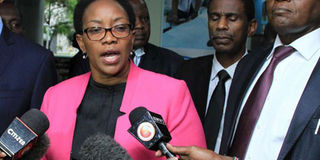Failure to obey procedure to blame for botched KNH surgery

Health Cabinet Secretary Sicily Kariuki addresses the media at Kenyatta National Hospital on March 2, 2018. Some MPs want her relieved of her post. PHOTO | JEFF ANGOTE | NATION MEDIA GROUP
What you need to know:
- The KNH chief executive officer, Ms Lily Koros, and her deputy Bernard Githae were sent on compulsory leave.
- It is not clear whether the consultant surgeon signed the consent form on behalf of the patient.
Surgeons at the Kenyatta National Hospital could have missed basic but vital procedures leading to the bungled operation that saw the wrong patient going under the knife, Sunday Nation can reveal.
On the spot are the consultant neurosurgeon who oversaw the bungled operation, the neurosurgery student who conducted it, the ward nurse, the theatre receiving nurse and the anaesthetist.
Other than the consultant neurosurgeon, the other four have since been suspended for their alleged role in the surgery.
Sunday Nation pieced together the events that took place on the night of February 19, leading to the confusion that saw a patient who did not need surgery undergo the procedure.
PATIENTS
According to multiple sources, two male African adult patients were brought to KNH’s Accident and Emergency department both with head injuries and unconscious.
Coincidentally, they shared the last name. Making matters even more complicated is the fact that both were brought in by Good Samaritans and so far, no relatives have shown up.
The only thing that set these two men apart was that one had a blood clot in the head, which required him to undergo a surgery while the other only required nursing and medication to heal a trauma swelling in his head.
Both men were attended to at the casualty and admitted in the same ward, 5A, which houses general surgery patients.
Sunday Nation learnt that neurosurgeons have always insisted on admitting staff at the A&E to take a photo of the patient and attach to their file, or put a name tag on their wrists. The latter happened in this case.
NAME TAGS
But in a strange turnout, the name tags were switched. And as a result, there was a mix-up of identification tags that saw the wrong man wheeled into theatre and his skull opened.
Questions have however arose as to whether the medics who attended to the two patients adhered to some of the basic but very vital procedures before and during the operation, resulting in the embarrassing outcome that has seen the chief executive officer, Ms Lily Koros and her deputy Dr Bernard Githae sent on compulsory leave.
Because both patients were unconscious at the time of admission and all through to the operation theatre, the medics could not have taken them through the first procedure, which is to explain to them their diagnosis, and why they needed that particular surgery.
In the event that the patient is unconscious, the procedure requires that the doctors explain the procedure to a relative who has accompanied the patient who then signs a consent form for the operation to proceed.
In this case, no relative was present. It is not clear whether the consultant surgeon signed the consent form on behalf of the patient, as required in instances where the patient is unconscious and the relatives are not present.
CONSENT FORM
Should the relatives be missing, a consultant doctor is charged with the responsibility of signing the consent on behalf of the patient.
Another vital step that appears to have been skipped is whether the operating doctor and the patient interact before the surgery commences to enable the former countercheck with the latter that everything is fine.
The surgeon then introduces his team of nurses, anaesthetists and assisting doctors, if any.
This never happened in the KNH case because the patient was now conscious but incoherent.
REGISTRAR
On Saturday, Master's degree students known as registrars working at KNH demanded that the consultant who oversaw the operation also be suspended for his role in the botched operation.
The registrars claim that their colleague, the neurosurgeon student who conducted the surgery, was unfairly victimised and that his suspension be lifted unconditionally as the hospital sorts out its system failures.
“While our friend may have exhibited some procedural shortcomings, the surgery was done on the wrong patient mainly because of wrong patient labelling by the ward staff,” a note written by the registrars reads.
A registrar is a doctor who is receiving advanced training in a specialist field of medicine in order to eventually become a consultant.





